| Listing 1 - 10 of 187 | << page >> |
Sort by
|
Digital
Year: 1890 Publisher: [Place of publication unknown] Selbstverlag des Verfassers
Abstract | Keywords | Export | Availability | Bookmark
 Loading...
Loading...Choose an application
- Reference Manager
- EndNote
- RefWorks (Direct export to RefWorks)
Digital
Year: 1897 Publisher: Freiberg Gerlach'sche Buchdruckerei
Abstract | Keywords | Export | Availability | Bookmark
 Loading...
Loading...Choose an application
- Reference Manager
- EndNote
- RefWorks (Direct export to RefWorks)
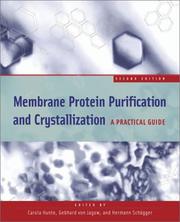
ISBN: 0123617766 9780123617767 9780080536170 0080536174 Year: 2003 Publisher: Boston, Mass. Academic Press, an imprint of Elsevier Science
Abstract | Keywords | Export | Availability | Bookmark
 Loading...
Loading...Choose an application
- Reference Manager
- EndNote
- RefWorks (Direct export to RefWorks)
This second edition of Membrane Protein Purification and Crystallization, A Practical Guide is written for bench scientists working in the fields of biochemistry, biology, and proteomic research. This guide presents isolation and crystallization techniques in a concise form, emphasizing the critical aspects unique to membrane proteins. It explains the principles of the methods and provides protocols of general use, permitting researchers and students new to this area to adapt these techniques to their particular needs. This edition is not only an update but is comprised mainly of new contributions. It is the first monograph compiling the essential approaches for membrane protein crystallization, and emphasizes recent progress in production and purification of recombinant membrane proteins. Key features * Provides general guidelines and strategies for isolation and crystallization of membrane proteins * Gives detailed protocols that have wide application, and low specialized equipment needs * Emphasizes recent progress in production and purification of recombinant membrane proteins, especially of histidine-tagged and other affinity-epitope-tagged proteins * Summarizes recent developments of Blue-Native PAGE, a high resolution separation technique, which is independent of the use of recombinant techniques, and is especially suited for proteomic analyses of membrane protein complexes * Gives detailed protocols for membrane protein crystallization, and describes the production and use of antibody fragments for high resolution crystallization * Presents a comprehensive guide to 2D-crystallization of membrane proteins.
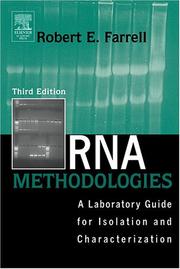
ISBN: 9780122496967 0122496965 0080454763 9780080454764 9780080884950 0080884954 9780123747273 0123747279 1282329987 9781282329980 9786612329982 661232998X Year: 2005 Publisher: Boston Elsevier/Academic Press
Abstract | Keywords | Export | Availability | Bookmark
 Loading...
Loading...Choose an application
- Reference Manager
- EndNote
- RefWorks (Direct export to RefWorks)
This laboratory guide represents a growing collection of tried, tested and optimized laboratory protocols for the isolation and characterization of eukaryotic RNA, with lesser emphasis on the characterization of prokaryotic transcripts. Collectively the chapters work together to embellish the RNA story, each presenting clear take-home lessons, liberally incorporating flow charts, tables and graphs to facilitate learning and assist in the planning and implementation phases of a project. RNA Methodologies, 3rd edition includes approximately 30% new material, including chapters on the more recent technologies of RNA interference including: RNAi; Microarrays; Bioinformatics. It also includes new sections on: new and improved RT-PCR techniques; innovative 5 and 3 RACE techniques; subtractive PCR methods; methods for improving cDNA synthesis. * Author is a well-recognized expert in the field of RNA experimentation and founded Exon-Intron, a well-known biotechnology educational workshop center * Includes classic and contemporary techniques * Incorporates flow charts, tables, and graphs to facilitate learning and assist in the planning phases of projects. This is the fourth edition of the successful laboratory guide which has translated the rich story of riboneucleic acid for over fifteen years. RNA Methodologies 4e presents the latest collection of tested laboratory protocols for the isolation and characterization of eukaryotic and prokaryotic RNA with greater emphasis on transcript profiling, including quantification issues and elucidation of alternative transcription start sites. Collectively the chapters work together providing analysis with clear take-home lessons to assist researchers to understand RNA and to optimize time at the bench. The abundant use of flow charts, tables and graphs are especially helpful in the planning and implementation phases of a project and facilitate learning. 30% new material in this edition includes the addition of RNA isolation protocols including RNA isolation from tissue, expansion of PCR optimization analysis and RNA interference sections, the introduction of a new chapter dealing with the molecular biology of plants, and an expanded glossary.
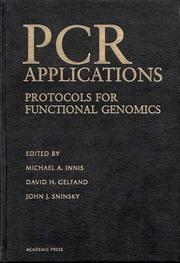
ISBN: 9780080919638 0080919634 0123721857 9780123721853 0123721865 9780123721860 Year: 1999 Publisher: San Diego Academic Press
Abstract | Keywords | Export | Availability | Bookmark
 Loading...
Loading...Choose an application
- Reference Manager
- EndNote
- RefWorks (Direct export to RefWorks)
PCR is the powerful technique used in molecular biology. This book examines the developments in this field. It discusses techniques that focus on gene discovery, genomics, and DNA array technology, which are contributing factors to the now-occurring bioinformatics boom. It covers quantitative PCR techniques, including the use of standards.
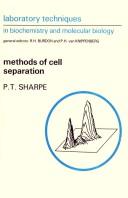
ISBN: 9780080858883 0080858880 0444809759 9780444809759 Year: 1988 Publisher: New York, NY, U.S.A. Sole distributors for the U.S.A. and Canada, Elsevier Science Pub. Co
Abstract | Keywords | Export | Availability | Bookmark
 Loading...
Loading...Choose an application
- Reference Manager
- EndNote
- RefWorks (Direct export to RefWorks)
Synthetic Polypeptides as Antigens is the first volume to give a comprehensive treatment under one cover of the various techniques used for synthesizing peptides by the solid phase approach, for coupling them to carrier molecules and analyzing their immunochemical activity by a variety of immunoassays. This book also describes methods for analyzing the antigenic structure of proteins and predicting the location of their antigenic sites. Recent advances in the detection of gene products with antipeptide antibodies, and the still controversial use of synthetic peptides as vaccines are also descr.
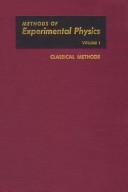
ISBN: 9780124759015 0124759017 9780080859743 0080859747 Year: 1959 Publisher: New York Academic Press
Abstract | Keywords | Export | Availability | Bookmark
 Loading...
Loading...Choose an application
- Reference Manager
- EndNote
- RefWorks (Direct export to RefWorks)
Digital
ISBN: 9789461970343 Year: 2012 Publisher: Antwerpen Universiteit Antwerpen, Departement Fysica
Abstract | Keywords | Export | Availability | Bookmark
 Loading...
Loading...Choose an application
- Reference Manager
- EndNote
- RefWorks (Direct export to RefWorks)
Digital
ISBN: 9780081009710 9780081010594 0081010591 Year: 2017 Publisher: Amsterdam Elsevier
Abstract | Keywords | Export | Availability | Bookmark
 Loading...
Loading...Choose an application
- Reference Manager
- EndNote
- RefWorks (Direct export to RefWorks)
Bretherick's Handbook of Reactive Chemical Hazards, Eighth Edition presents the latest updates on the unexpected, but predictable, loss of containment and explosion hazards from chemicals and their admixtures and actual accidents. The extensively cross-referenced book enables readers to avoid explosion and loss of containment of chemicals. Primary and more specialized sources are easily traced, and this new edition includes available record updates, also adding a number of new records. In this newly updated and expanded edition, the content is presented in a clear and user-friendly format.
Multi
ISBN: 9780128046791 0128046791 0128046783 9780128046784 Year: 2017 Publisher: London : Academic Press,
Abstract | Keywords | Export | Availability | Bookmark
 Loading...
Loading...Choose an application
- Reference Manager
- EndNote
- RefWorks (Direct export to RefWorks)
RNA Methodologies, Fifth Edition continues its tradition of excellence in providing the most up-to-date ribonucleic acid lab techniques for seasoned scientists and graduate students alike. This edition features new material on the exploding field of microRNA as well as the methods for the profiling of gene expression, both which have changed considerably in recent years. As a leader in the field, Dr. Farrell provides a wealth of knowledge on the topic of RNA while also giving readers helpful hints from his own personal experience in this subject area. Beginning with the most contemporary, RNA Methodologies, Fifth Edition, presents the essential techniques to use when working with RNA for the experienced practitioner while at the same time providing images and examples to aid the beginner in fully understanding this important branch of molecular biology. The next generation of scientists can look to this work as a guide for ensuring high productivity and highly representative data, as well as best practices in troubleshooting laboratory problems when they arise. Features new material in miRNA, MIQE guidelines, biomarkers, RNA sequencing, digital PCR and moreIncludes expanded coverage on quantitative PCR techniques, RNAi, bioinformatics, the role of locked nucleic acids, aptamer biology, PCR arrays, and other modern technologiesPresents comprehensive, cutting-edge information covering all aspects of working with RNABuilds from basic information on RNA techniques to in-depth protocols to guidance on how to modify and adjust each step of a particular applicationPresents multiple avenues for addressing the same experimental goals.
Chemical laboratory practice --- RNA --- Analysis
| Listing 1 - 10 of 187 | << page >> |
Sort by
|

 Search
Search Feedback
Feedback About UniCat
About UniCat  Help
Help News
News